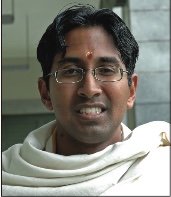BY ARVIND CHANDRAKANTAN
American-born hindus have very little expo-sure to the deep social problems faced by India’s Dalit and Harijan communities, who comprise 25% of our Hindu family. But time and again we face burning allegations of caste discrimination within Hinduism. Scriptural documentation of caste in Hinduism is sparse. Most interpretations of caste come from proselytizing Western Christian missionaries. In fact, the origin of the caste supposedly from the four parts of Purusha, the Cosmic Man, can be seen in another light. If Purusha represents the transcendental nature of consciousness, then the brahmin is he who lives eternally in Brahman (enlightened state), the kshatriya is he who fights the practical nature of the duality of the mind, the vaishya is he who teeters towards the tamasic side of the mind but exists in the rajasic state, and the sudra is he who exists in the tamasic state. So before we label one of our Hindu brethren with a caste name, we should delineate our own. Myself and my friend Eswaran wanted to learn about the issues first hand. Here is our interview with Dalit leader, Sri Kalidoss Swamigal, done during our summer 2008 trip to India. He elucidates the pivotal keys needed for change.
What is the form of discrimination faced by Dalit people?
First, the concept of “Dalit” is found not just in the Hindu community. All religions, communities and races have had this throughout history. To think of it as a Hindu issue is a false concept. Poverty is our primary problem. Our children are unable to benefit from reservations (affirmative actions programs) because they are forced into the work force very early. Reservations for colleges and jobs don’t help if you don’t even have enough food or water. Until basic amenities are met, reservations can do only so much. Many in our community have done well having those amenities. But, we are 25% of the Hindu population, yet we are still under-represented in several areas because so many of our reservations go unfilled each year.
At a religious level, we often see money flow in from Christian and Muslim organizations overseas to help Dalits, but not from Hindu organizations. This leads many of our community to feel that Hindus do not care about them. The end of casteism would end a lot of problems faced by our community, but it would not help us overcome poverty. If a man has food, water and basic necessities, then he can focus on education and upliftment. Education is the panacea to many problems for all communities, not just for ours. So many bright young Dalit boys and girls are unable to fulfill their educational goals each year because they are pushed into the workforce at a young age to help provide for their families.
How did the Dalit community come to be? One third of the ancient Saivite Tamil saints were from Dalits.
In ancient times, the caste system was not so stratified. This allowed several members of the so-called “lower” communities to come up. This is well recognized in religious texts from all over India, not only in Tamil classics. Caste classifications became fixed only later.
What is Hinduism to your community?
Hinduism means a lot to our community. Even if people get converted to either Christianity or Islam, it is foreign. You can go to church or mosque for two or three days, but you grew up with Lord Siva, Ganapati and Murugan. So we cannot deny this. Hence many reconvert to Hinduism. Other religions also do not have a track record of treating Dalits well, which is another reason for reconversion.
What is the religious practice within your community? Do you have your own temples and priesthood?
Our practices are no different than any other Hindus. We eat and pray like other Hindus, and our festivals are the same also. There is no subcastes of priesthoods in the Dalit community, and, in fact, there are minimal subdivisions within our community.
How do you see “untouchability” or impure vocations?
There are jobs that the Dalit community do that other Hindus would not do. But to label our jobs as ritually impure is unfair. Even if we clean the temple floor, is this not a service to God? Many people in our community do not resent the work unless it is seen by other Hindus as being a “Dalit” job. These labels create resentment.
What should the Dalit community do to improve its status?
Many Dalits have been very successful over the years, but they don’t help other Dalits to come up.
Why are Dalits converted to Christianity and then some reconverting back to Hinduism?
Dalits see Christians coming to help them, and they help to propagate the misconception that Hindus do not care about them. Both are untrue. Dalits who have converted to other religions have not benefitted in any way, and many have converted back to Hinduism in recent years. If you are to struggle, why not struggle with your own religion that you grew up with?
contact: all india dalit hindu maakal aanmega sangam, sankralaya,
63 mayor ramanathan salai, chetpet, chennai, india 600031.
Head of the Sangam, Sri Kalidoss Swamigal (interview above) has been nominated for the Shri Narayana Guru award for outstanding leadership in social reform given the the Hindu American Foundation and Global Human Rights Defence for outstanding work to uplift dalits.
visit:http://www.hafsite.org/harijan_award.htm [http://www.hafsite.org/harijan_award.htm]


